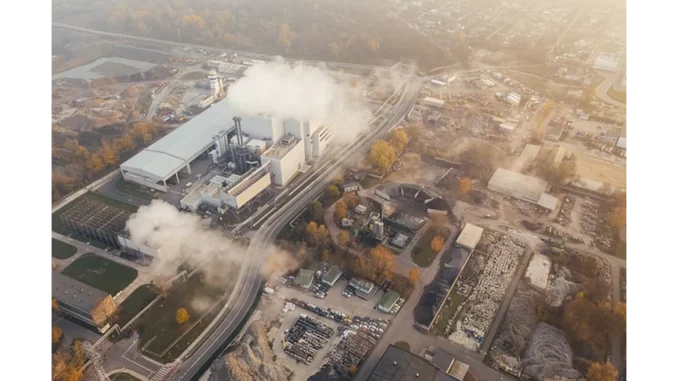
The United Kingdom stands poised on the brink of a transformative phase in its energy and industrial sectors with the imminent commencement of the East Coast Cluster, the nation’s most expansive carbon capture and storage (CCS) initiative. Anticipated to break ground in 2025, this project represents a pivotal milestone in the UK’s strategic pursuit of climate resilience and industrial rejuvenation. Designed to capture and sequester carbon emissions from industries clustered within the Teesside region, the East Coast Cluster signifies a critical stride towards addressing the climate crisis while simultaneously revitalising the industrial heartlands in the North East.
Air quality is vital in planning. See how Focus360 Energy can assist.
The East Coast Cluster heralds a new era in the UK’s clean energy endeavour, marking it as the inaugural carbon capture project of its calibre within the country. By setting a benchmark for forthcoming initiatives dedicated to curbing carbon emissions, it seeks to lay the groundwork for sustainable industrial growth. This project is integral to the government’s broader Plan for Change, which aims to stimulate economic growth, ensure energy security, and protect consumers from escalating energy costs. By aligning with this plan, the East Coast Cluster not only positions itself as a key player in the UK’s energy strategy but also promises to foster economic resilience and sustainability.
From an economic perspective, the implications of the East Coast Cluster are substantial. It is poised to directly support 2,000 jobs in the North East, with projections suggesting the creation of tens of thousands more positions across the UK in subsequent years. A significant investment of £4 billion in supply chain contracts is expected to catalyse regional growth and investment, thereby generating substantial opportunities for local enterprises and communities. This wave of economic activity underscores the government’s resolve to rejuvenate industrial locales and integrate them into the transition towards a low-carbon economy.
Beyond its environmental objectives, the East Coast Cluster embodies a commitment to technological innovation and energy security. Key projects such as Net Zero Teesside Power are set to deliver secure, low-carbon energy capable of powering up to one million homes by 2028. This initiative highlights the transformative potential of CCS technology within the energy landscape, offering a dependable source of low-carbon power and diminishing the UK’s dependence on fossil fuels. By adopting such cutting-edge technologies, the East Coast Cluster exemplifies the path towards a more sustainable energy future.
The collaborative nature of the East Coast Cluster is a testament to the unified efforts of government, industry, and academia. This ambitious project brings together a wide array of stakeholders, each contributing their expertise and resources to ensure its successful realisation. Energy giants such as BP, Equinor, and TotalEnergies are instrumental in the project’s development, leveraging their extensive experience in energy provision and carbon management to advance the UK’s decarbonisation objectives. This collaboration is a critical factor in the project’s potential to achieve its ambitious goals.
Underpinning the East Coast Cluster is a robust regulatory and financial framework, crafted to nurture the CCS industry’s growth. The North Sea Transition Authority (NSTA) has granted the first-ever carbon storage permit to the Endurance store, marking a crucial advancement in the project’s progression. Furthermore, Ofgem, the UK’s energy regulator, is tasked with overseeing the economic dimensions of the carbon capture, utilisation, and storage (CCUS) network, ensuring that the project offers value for money to both industry stakeholders and consumers alike.
As the East Coast Cluster edges closer to its construction phase, it emerges as a beacon of hope for the UK’s industrial and environmental trajectory. By effectively capturing and storing carbon emissions, it will play an indispensable role in lowering the UK’s carbon footprint and propelling the nation towards its net-zero targets. Additionally, this project is expected to serve as a catalyst for economic growth and job creation, delivering a much-needed stimulus to the North East and the broader UK economy.
Ultimately, the East Coast Cluster transcends its role as a mere carbon capture project; it embodies the UK’s steadfast commitment to a sustainable and prosperous future. With construction slated to commence in 2025, it is set to usher in a new dawn of clean energy and industrial innovation, establishing a standard for other nations in the global fight against climate change. Through its multifaceted impact, the East Coast Cluster promises to not only reshape the UK’s energy landscape but also inspire a transformative approach to industrial and environmental challenges.


Be the first to comment